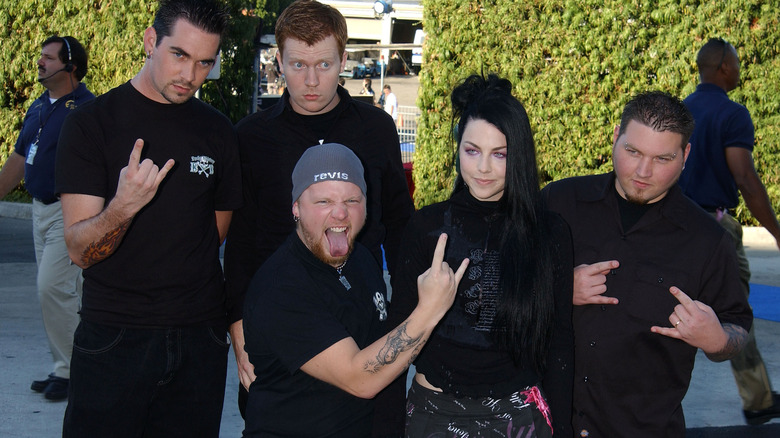The Origin Of Evanescence's Band Name Explained
In 2003, Evanescence materialized onto the scene. Fronted by the classically-trained powerhouse Amy Lee, the five-piece band infused the airwaves with their innovative blend of goth-rock and symphonic metal. Driven by anthems like "Going Under" and "Bring Me to Life," their debut album "Fallen" was a smash hit. It sold over 141,000 copies in its first week and rose high on the Billboard charts, debuting at No. 7 and peaking at No. 3. The enduring classic would go on to sell over 10 million units, earning a rare Diamond certification from the Recording Industry Association of America (RIAA) nearly two decades after its debut.
Perhaps just as intriguing as the band's meteoric rise to success is their name. Gliding off the tongue, Evanescence ("ev"-"uh"-"ness"-"uhns"), sounds almost mystical — which, apparently, was what they were going for. "Evanescence in English means to vanish from the plane of vision and memory," Lee explained in a 2003 BBC interview (via Orkus1.com). "It's a word that most people don't even know, just like we came out of nowhere and we wanted to have that mystical element to it. I also think it sounds beautiful, like our music." Mirroring the meaning of their name, Evanescence truly seemed to come out of nowhere, but they wouldn't be vanishing anytime soon.
The origin story of Evanescence
Known for their morose lyrics and dark cinematic melodies fit for a funeral, the group's original line-up consisted of just two members: Amy Lee on piano and lead vocals and Ben Moody on guitar. The Arkansas-based pair met at a youth camp in 1994 when they were in their early teens. Instantly connecting over music, they soon began co-writing and home-recording tunes together, drawing inspiration from an eclectic range of artists, from Tori Amos to Danny Elfman. According to the archived Evanescence bio, the duo found small town success when one of their earliest goth anthems, "Understanding," became popular on their local radio station in Little Rock. But they retained an air of mystery by initially forgoing live performances, simply because they couldn't afford to pay accompanying musicians.
With their rising success, the dynamic duo needed an official name. In a 2003 interview, Lee cited the dictionary as their source of inspiration, reflecting on how she and Moody flipped through the behemoth book in search of a word that was as unusual and mysterious as their music. They landed on 'Evanescence,' of course, which Merriam-Webster defines as "the process of or fact of evanescing" (to "dissipate like vapor"). In 1998, the pair released their debut EP, the self-titled "Evanescence," ascending on a mystical musical journey that would culminate in worldwide success half-a-decade later.
The evolution of Evanescence
Before they decided on the name Evanescence, there were some other names in the hat. Original contenders for a band name included Childish Intentions and Knitting. The duo also experimented with the name Stricken, but that ultimately struck out, too.
Another name they considered was off by just a couple letters. "I was more of an advocate for [the name Evanescence] at first than Amy was ... the first word we milled over was 'evanescent,'" Ben Moody recalled in a 2003 interview. "And it was after we changed it to 'Evanescence' that she agreed to it ... it just sort of stuck."
The name stuck longer than Moody, who departed the band during their world tour in 2003 and had a lot to say about Amy Lee in regards to their creative differences. By that time, Evanescence had expanded with the addition of John LeCompt on guitar, Rocky Gray on drums, and Will Boyd on bass. Leading with ethereal emo vocal stylings and bewitching piano melodies, Amy Lee is the only original member in the band today, joined by Tim McCord and Troy McLawhorn on guitars, Emma Anzai on bass, and Will Hunt on drums. Filling earphones and stadiums with their haunting goth metal, Evanescence has contradicted the dissipation their name suggests, continuing to bring fans to life after 20 years.


